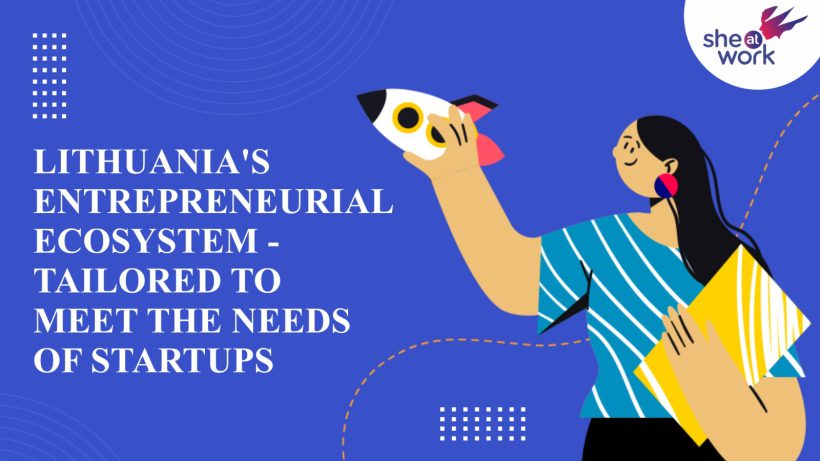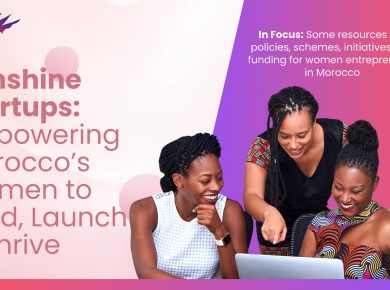#LithuaniaBusiness #WomenEntrepreneurs #GovernmentSchemes
Lithuania, a nation with a remarkable reputation for fostering innovation and business growth, provides a thriving landscape for entrepreneurs. The country’s commitment to creating a supportive business environment is evident through its impressive global rankings – like the 11th place for ease of doing business, 2nd place for business startup procedures and 3rd place for the lowest profit tax.
Lithuania’s entrepreneurial ecosystem is shaped by a rich mix of infrastructure solutions, tailored to meet the needs of startups. These include – technology parks, business accelerators, incubators, co-working spaces and hubs – all contributing to the nation’s growing reputation as one of Europe’s fastest-growing fintech hubs.
A prominent feature in Lithuania is its world-renowned internet connectivity. Boasting of having the world’s fastest WIFI speed and the highest internet bandwidth in the Central and Eastern European region, Lithuania’s digital infrastructure is nothing short of exceptional.
Moreover, Lithuania has diligently cultivated an ecosystem that caters to startups and their stakeholders. This ecosystem offers a multitude of opportunities for investments and funding for innovative businesses. These include – venture capital funds, accelerators, angel investor support, grant programs, and various other supporting initiatives.
One of Lithuania’s most significant assets is its highly skilled, multilingual talent pool, a vital resource for businesses aiming to thrive in today’s dynamic and globally connected business environment.
Here, we will delve into the various government schemes and initiatives in Lithuania that are aimed at empowering women entrepreneurs and fostering gender equality in the business world.
> Entrepreneurship Policies in Lithuania
Inclusive entrepreneurship policies are capturing increasing attention in Lithuania; and there are many activities, projects and initiatives to promote youth entrepreneurship and to a lesser extent, also for women, the unemployed, rural residents and people with disabilities.
This country profile benchmarks key self-employment and entrepreneurship data for women, youth, seniors and immigrants in Lithuania against the European Union average. It also highlights recent inclusive entrepreneurship policy developments and current policy issues.
Lithuania’s Progress Strategy “Lithuania 2030”
The promotion of entrepreneurship and self-employment is an important policy objective in Lithuania. Lithuania’s Progress Strategy “Lithuania 2030”, approved by the Seimas (ie The Parliament), seeks to build a “smart” economy through the intensive application of scientific knowledge, stimulation of innovation-driven entrepreneurship & increased competitiveness of Lithuanian businesses. The Strategy stresses on the need for a business-friendly environment and tries to simplify business regulations. As a high-level umbrella type document, it does not outline specific measures to foster entrepreneurship among key social target groups such as youth, women, migrants, long-term unemployed, older people, and people with disabilities.
Similarly, the National Progress Programme for 2014-20 (NPP) sets out several priorities, including the creation of an “environment favourable for economic growth.” This seeks to create favourable conditions for entrepreneurship and sustainable businesses. Measures include – business-facilitation services for business start-ups and ensuring the availability of financial sources for starting and developing business. The NPP highlights the development of entrepreneurial skills for children and youth by supporting integrated programmes to foster entrepreneurial skills. Responsibility for the implementation of the above tasks is shared between the Ministry of the Economy3 (MoE), the Ministry of Social Security and Labour4 (MoSSL), and the Ministry of Education and Science5 (MoES).
The Entrepreneurship Action Plan of Lithuania for 2014-20
The Entrepreneurship Action Plan of Lithuania for 2014-20, approved by the Minister for the Economy, defines actions towards consistent growth and promotion of entrepreneurship. The Action Plan sets out three tasks focusing on raising the level of entrepreneurship in the country: to establish a consistent and continuous system of entrepreneurship education; to create a favourable environment for starting and developing a business, and to promote entrepreneurship by ensuring accessibility of public services to businesses, distinguishing entrepreneurship of target groups (youth, women) and start-ups, as well as social and regional entrepreneurship, and developing a positive public image of the entrepreneurs.
The Programme for Increasing Employment for 2014–20
The Programme for Increasing Employment for 2014–20, approved by the government, includes measures aimed at the development of entrepreneurship mindsets & supports business creation initiatives. Relevant measures include – the facilitation of new business creation and self-employment, business start-up advice, improved access to business services and financial resources for persons starting up and developing business activities, and mainstreaming of an entrepreneurial approach in the national education system. The Programme focuses on promoting entrepreneurship among youth, in rural territories and in regions with high unemployment levels.
The Lithuanian Innovation Strategy for 2010-207
The Lithuanian Innovation Strategy for 2010-207 highlights creativity and entrepreneurship – as key determining factors for innovation and economic growth. In order to foster an innovative society, the strategy supports measures for new knowledge creation and encourages its application. It also promotes innovative business start-up by providing favourable conditions and regulations, while raising awareness on innovations. The plans are to provide public services for starting innovative business and mentoring services SMEs. There are a number of youth policies that cover entrepreneurship promotion and support. For example, youth entrepreneurship support is outlined in the Lithuanian National Youth Policy Development Programme.
https://www.oecd.org/cfe/smes/LITHUANIA-IE-Country-Note-2018.pdf
> Government Regulations
The business environment here is to conducive to starting and running an enterprise. The World Bank’s Doing Business 2018 report ranks Lithuania 16th globally (from 190 countries) and 6th in the EU. Significantly, entrepreneurship is more than just officially launching a business – it is about people’s attitude and motivation. The business environment as an extrinsic factor influences the entrepreneurial spirit.
The greatest challenge in developing a more supportive policy framework for inclusive entrepreneurship is in – defining clear inclusive entrepreneurship policy design and implementation definitions between the key ministries and to develop corresponding leadership and administrative capacities to develop policies in this area.
A key government priority is the promotion of an attractive investment environment and a business-friendly eco-system for regional development and innovation.
> Financing entrepreneurship
Financing remains one of the main challenges for all start-ups and affects key social target groups in entrepreneurship to a disproportionate extent. About half of SMEs finance business development solely by internal resources, while 38% would take out a loan from credit institutions. It is estimated that 9% SMEs intend to participate in public start-up financing programmes.
Another point is that the 2014-20 Rural Development cases can be distinguished by a number of specific initiatives, which are viewed as supporting the entrepreneurship of disadvantaged groups (including rural youth, women and older people who are especially vulnerable). One of the particular challenges in Lithuania is supporting entrepreneurs in rural areas, within the context of a demographic shift.
There are also supports anticipated for innovative start-ups. The government established a venture capital fund by 2018, to invest in new viable ideas. It is also planned to set up acceleration, training and refresher programmes for start-ups students.
In addition, the “Co-investment Fund 2” is a venture capital facility, managed by INVEGA together with its subsidiary LTD “Kofinansavimas”. This measure is aimed at developing the Lithuanian venture capital market, raising new venture capital market participants and thus providing more capital access to new viable Lithuanian enterprises with limited access to the banking financing.
https://www.oecd.org/cfe/smes/LITHUANIA-IE-Country-Note-2018.pdf
> Entrepreneurial Skills
In 2007-13, a number of initiatives were rounded up to promote entrepreneurship. These included the first business year baskets (vouchers) were introduced for youth entrepreneurs. These could be obtained by attending entrepreneurship events organized by Enterprise Lithuania and used to “purchase” support services, eg professional business advice.
Lithuania also has a number of smaller measures that contribute to the improvement of skills across various target groups. Many of these initiatives are funded from various EU programmes; some of them are non-governmental initiatives closely related with the relevant ministries. Some recent examples include – Futurepreneurs, Junior Achievement Lithuania, Promotion of entrepreneurship among women, and IT and business start-up training courses.
The primary intervention project – “Discover Yourself” was launched in 2016. Those participants of the project Discover Yourself who did not receive unsubsidised job offers were involved in the secondary intervention project “New Start” (Naujas startas).
A National Mentor Network was established in 2016. It allows new entrepreneurs to learn from experienced entrepreneurs and experts. The network is supported by Enterprise Lithuania, which provides consultations, trainings and regularly organises events, such as the LOGIN Start-up Fair.
Women entrepreneurship
Action Plan for the implementation of the 2015-21 National Programme of Equal Opportunities for Women and Men – the main objective is to promote equal opportunities for women and men in employment and employment.
The following tasks are foreseen here: (i) to reduce wage differences between women and men; (ii) to reduce gender segregation in the labour market and in education; (iii) increasing the opportunities for women and especially rural women to take up business and develop it.
https://www.oecd.org/cfe/smes/LITHUANIA-IE-Country-Note-2018.pdf










